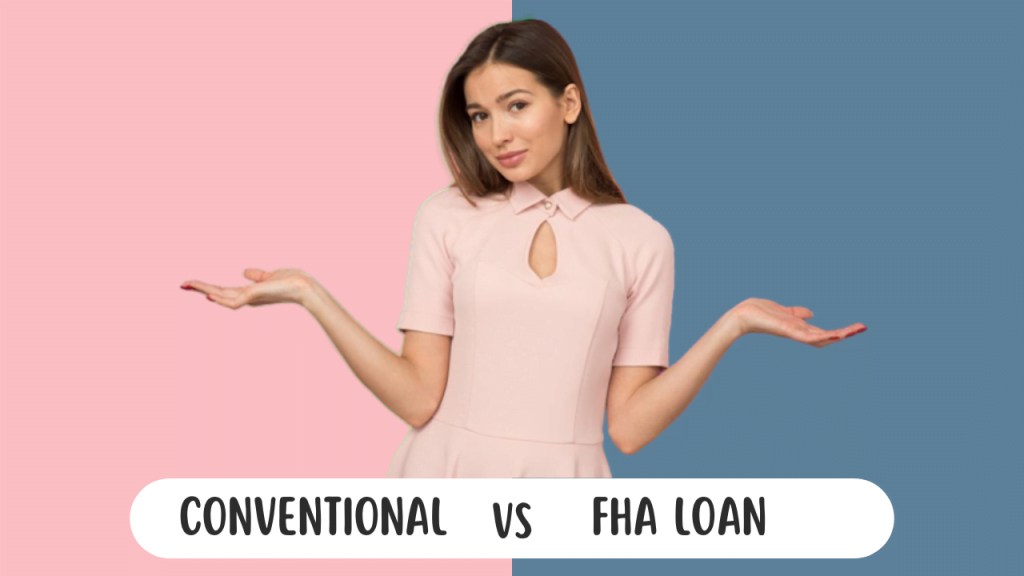Conventional Vs. FHA Loans
Conventional loan is not guaranteed by the government, whereas FHA loan is a government backed loan. Here in this content you will get the complete information about Conventional Vs FHA loans, the applicant eligibility criteria, who can take the loan, and which one is better option. So if you are confused between conventional and FHA loan, I hope after going through the article you can clear your confusion

Conventional Vs FHA Loans
Understanding the differences between them and considering which one is better option. In this article we are going to cover Conventional loan Vs FHA, down payment, credit score, mortgage insurance and many more.
What are Conventional Loans?
A conventional loan is any mortgage loan or any type of home buyers’ loan that is not secured or guaranteed by the government, but instead is available through a private lender. Conventional loans typically cost less than FHA loans but can be more difficult to get. A conventional mortgage loan is a conforming loan, which simply means that it meets the requirements for Fannie Mae or Freddie Mac.
Read Also: Amazing Health Benefits of Potato You Must Know
There are two main categories of conventional loans:
Conforming loans
Conforming loans have maximum loan amounts that are set by the government. Other rules for conforming loans are set by Fannie Mae or Freddie Mac, companies that provide backing for conforming loans.
Non-conforming loans
Non-conforming loans are less standardized. Eligibility, pricing, and features can vary widely by lender.
What are FHA Loans?
An FHA loan is a US Federal Housing Administration mortgage insurance backed by mortgage loan, which is a part of the U.S. Department of Housing and Urban Development and is provided by an FHA approved lender. FHA mortgage insurance protects lenders against losses. This means that if you default on an FHA loan, the FHA will pay your remaining balance to your lender.
FHA loans are intended to help people and purchase a home that they would not otherwise be able to afford. They allow small down payments and are open to borrowers with lower credit scores.
Read Also: FHA Vs VA Loan
Difference between Conventional Vs. FHA loans
| FHA Loan | Conventional Loan |
| FHA loans are backed by the Federal Housing Administration (FHA) and approved by FHA approved lenders | Unlike FHA loan, conventional loans are not insured or guaranteed by the federal agency |
| FHA loan does not have strict lending standards | Conventional loans have Strict lending standards |
| Smaller down payment requirements as low as 3.5% | Larger down payment requirements then FHA loans |
| An FHA applicant can qualify with a credit score as low as 500, though 580 is preferable | To qualify for a conventional loan, you generally need a credit score of 620 or higher |
| Debt to income ration is 50% or less | Maximum of 45% |
| Can be used only to finance a primary residence | Can finance a primary residence, vacation home, rental property, etc. |
Applicant Eligibility
Homebuyers can qualify for an FHA loan in certain conditions:
- Meet minimum Credit score requirements of at least 500
- Debt to income ratio of 50% or less
- 3.5% of down payment if your credit score is 580 or higher
- 10% down payment if your credit score is 500-579
- The house must be your primary residence and meet FHA’s property requirements
- Can provide proof of employment and steady income
To qualify for conventional loan, consumers must meet the following requirements:
- Consumers typically must have stellar credit reports with no significant blemishes
- Consumers must have credit score of at least 620
- Debt to income ratio below 36%
- Proof of cash available for a down payment
Mortgage Insurance
Depending on your mortgage terms and the size of your down payment, you might have to pay mortgage insurance. Unlike other types of insurance, mortgage insurance does not protect you. Mortgage insurance protects the lender in case of default i.e., it protects the lender if you stop making payments.
FHA loan borrowers must pay mandatory mortgage insurance (MIPs), regardless of the down payment amount. There is an up-front payment, which can be rolled into the loan and paid throughout its life, plus monthly premiums. Upfront MIP of 1.75% of the loan amount and MIP amounts are usually required. FHA mortgage insurance premiums last for the life of the loan if you make a down payment of less than 10%. If you make a down payment of 10% or more on an FHA loan, you will pay FHA mortgage insurance for 11 years.
While conventional loans, you must pay for private mortgage insurance (PMI). If your down payment is less than 20%. You can ask your lender to cancel PMI when your mortgage balance is scheduled to fall to 80% of the original value of your home (the contrast sales price or the appraised value when you bought the home). Otherwise, your lender must remove PMI when your balance drops to 78%.
Pros and Cons of FHA Vs Conventional Loans
Pros of FHA loan
- Lower down payment
- Easier landing standards
- Lower interest rates
- Low or no closing cost
Cons of FHA loan
- Mandatory mortgage insurance
- For primary residence only
- Restrictive loan maximums
Pros of Conventional loans
- Mortgage insurance depends on equity
- No limited to primary residence
- Opportunity to borrow more
Cons of Conventional loan
- Strict lending requirements
- Need higher credit score to qualify
- Need lower debt-to-income (DTI) ratio
Fees And Closing Costs of FHA Vs Conventional loans
FHA loans tend to have higher closing costs then conventional loans, but because FHA loans allow the seller to pay for more of your closing costs than conventional loans, they may actually be cheaper. Conventional loans only allow outside parties to contribute 3% of your closing costs if you are making 10% or less. FHA loans, on the other hand allow the seller to pay 6% of your closing costs regardless of your down payment amount, so they may be better for buyers with low cash reserves.
Down payment and loan limits
FHA loans require a minimum down payment of 3.5%. Conventional loans on the other hand allow you to put as little as 3% down, which makes them a better option for buyers with minimal savings. However, you will need good credit to be able to qualify for low down payment mortgages.
When comparing FHA and Conventional loans, its important to note that both types of loan, limit the amount you can borrow. Maximum loan amounts vary by country, and this limits usually change each year. Both the FHA and conventional loans have limits on the amount of money you can borrow.
Conventional loan must meet loan limits set by the federal Housing Finance Agency. These limits are usually the same regardless of where you are buying a home, except for some higher cost countries.
FHA mortgage limits vary by the country where the property you are buying is located and tend to be lower than conventional loan.
Credit Score Requirements
FHA loans are usually easier to qualify for, which a minimum credit score of 580 to be eligible to make 3.5% down payment. If your credit score is 500 to 579, you may qualify for an FHA loan with 10% down payment.
On the other hand, Conventional loans typically requires a credit score of 620 or higher. If your credit score is above 620, it’s worth looking into a conventional loan with 3% down. Especially because, as your credit score goes up, your mortgage rate and PMI costs go down.
Interest Rates
Conventional loan interest rates tend to be higher than those of government-backed mortgages, such as FHA loans. The interest rates carried by a conventional mortgage depends on several factors, including the terms of the loan – its length, its size, and whether the interest rates is fixed interest or adjustable – as well as current economic or financial market conditions.
FHA interest rates can be competitive compared to conventional mortgages. This is because the government backing allows lenders to offer you a lower rate. The rate depends on several factors, including the prevailing interest rates, your income, credit score, the amount you plan to borrow, your down payment amount, DTI ration and more.
FHA or Conventional Loan: Deciding Which Loan Is Right For You
Both FHA and Conventional loan can be good option depending on a borrowers specific needs. FHA loans usually have less strict lending standards than conventional loan, so they may be easier to qualify for borrowers with lower income rates and credit scores. But in addition to FHA loan, Conventional loan is often better if you have a good or excellent credit because your mortgage rate and PMI costs will go down. But an FHA loan is perfect for lower credit borrowers. FHA is often the cheaper option. If you are a first time buyer or someone with a weaker credit score, then an FHA mortgage loan can be easier to qualify for. This are only general guidelines for you, it’s totally your choice one want you want to choose. So be sure to look closely and have an in depth study at both loan types and proceed to choose the best one for your situation.
FAQs
1. Can I switch from FHA to Conventional loan?
Ans: Yes, you can switch from an FHA to a conventional loan by refinancing your mortgage. This means you get a new conventional loan to pay off your existing FHA loan. If you have 620 or higher credit score. Then, you may be able to save by switching from an FHA to a conventional loan with no PMI.
2. What credit score do I need for a conventional loan?
Ans: You will need credit score of at least 620 or higher to qualify for conventional loan.
3. What credit score do I need for an FHA loan?
Ans: FHA loan requires a credit score of 580 or higher in most cases.
4. What are the benefits of FHA loan?
Ans: Benefits of FHA loan are:
- Lower interest rate
- Easy or shorter time to qualify
- Low down payment
- Low closing cost
- Low FHA rates
- No income limits
- Financing available for one-to four-unit properties etc.
5. What are the benefits of Conventional loan?
Ans: Benefits of conventional loan are:
- Low costs
- Higher loan limits
- Flexible
- Stability in an unstable world
- Rewards good credit with lower interest rates
- Can be used for many types of homes
- Tend to be cheaper to close
- No limited to primary residence
- Opportunity to borrow more etc.

Hi, I’m Dev Kirtonia, Founder & CEO of Dev Library. A website that provides all SCERT, NCERT 3 to 12, and BA, B.com, B.Sc, and Computer Science with Post Graduate Notes & Suggestions, Novel, eBooks, Biography, Quotes, Study Materials, and more.









